RESEARCH AT 16 FIVE-STAR HOTELS – PART ‘A’-By Dr. Chandana (Chandi) Jayawardena DPhil
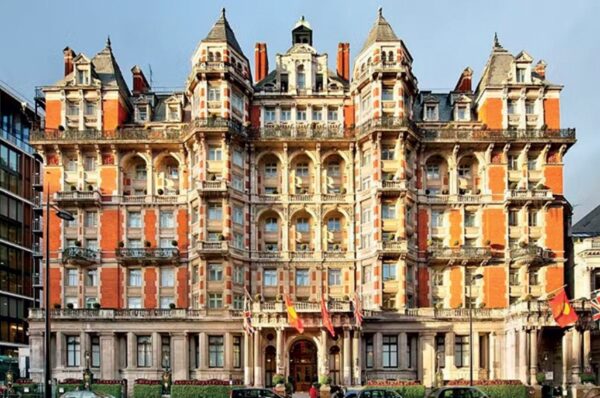
Source:Island
President – Chandi J. Associates Inc. Consulting, Canada
Founder & Administrator – Global Hospitality Forum
chandij@sympatico.ca
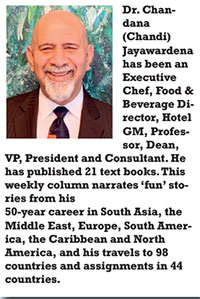
I was very pleased when in 1984 the University of Surrey (UoS) in the UK approved ‘Food and Beverage operations in the context of five-star London hotels’ as my M.Sc. dissertation topic. As directed by my supervisor, Professor Richard Kotas, I read all of the books – cover to cover and journal articles ever written in English about Food and Beverage management and operations. That took over two months. I was also directed by him to answer three questions, to provide context in my research undertaking:
= What are luxury hotels?
=What is the history of British luxury hotels?
=How does Food and Beverage management play a vital role in London five-star hotels?
What are Luxury Hotels?
Many have attempted to define a luxury hotel. The word ‘luxury’ has different meanings to different people depending on their experiences and expectations. In many classification guides in 1984, words such as ‘de-luxe’, five-star’, ‘first-class’ or ‘exclusive’ were used by hoteliers and writers.
Some felt that the large size of a hotel was a disadvantage for the hoteliers to maintain true ‘five-star’ standards. In 1984, none of the largest 18 hotels (with between 1,029 and 530 rooms) in UK, were five-star ranked. The average size of the 21 five-star hotels in UK, was 261 rooms (ranging from 509 to 86 rooms). In 1984, the average age of these 21 hotels was 55 years. A majority (16) of them were in London.
The 16 five-star London hotels had a total of 48 food and beverage outlets (an average of three per hotel). Average banqueting capacity for sit-down meals was 406. Grosvenor House had the largest banqueting operation able to accommodate 1,500 guests for a sit-down meal.
Most countries in the world use some form of hotel classification system, out of which 65 systems in 1984 were enforced by the public sector. In UK, in 1984, the key hotel grading schemes were carried out by private organizations. The most famous and respected hotel grading scheme was done by the Automobile Association (AA). In my research, I found that up to 1984, nothing academically significant had been written about the British hotel classification schemes or the five-star hotel grading. That gap provided me an opportunity.
What is the History of British Luxury Hotels?
During the eleventh century, a few monastic institutions as well as private homes in Britain were used to provide accommodation to travellers. The English inn had probably originated from the practice of receiving travellers by private householders. Religion played a vital part determining people’s habits in consumption of food and beverages. Towards the late fourteenth century, solid-stone built structures replaced the sheds operated as ale-houses and taverns in the provinces and inns in London.
With the popularity of wagons and other wheeled transport towards the end of the 16th century, a larger scale Tudor Inn operation replaced the Medieval Inn. The eighteenth century was the turning point for gastronomy in Britain. Influenced by major cities in continental Europe, such as Paris, Vienna, as well as the main cities of Switzerland, the word ‘Hotel’ became common in Britain after 1760.
Proper hotels, with managers, receptionists, porters and page-boys, gradually became common in Britain only at the beginning of the nineteenth century. Large British hotels such as The Grand, The Great Eastern, The Euston, The Charing Cross, The Great Western Royal, and The Grosvenor were developed in that era. One common feature of these hotels was that all of them were located near major railway terminals in London.
The opening of The Langham on Regent Street, London in 1865, is generally considered the origin of true luxury hotels in UK. Bailey’s Hotel was opened eleven years after that in 1876, and the world-famous London hotel, The Savoy, opened in 1889. Around the same time, a few luxury hotels were opened in well-known resort cities and towns. In 1984, the oldest British hotel with a five-star rating was The Imperial in Torquay, which was opened in 1866.
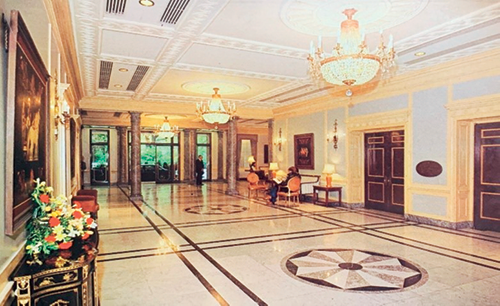
Using all British Connections for M.Sc. Research
The British hotel industry looked to London for the latest trends and London emerged easily as the trend setter of the industry. Within the five-star London hotels, the food and beverage departments appeared to be the most complex and versatile. In answering my third and most important research question – ‘How does food and beverage management play a vital role in London five-star hotels?’ I decided to work or observe in all 16 five-star hotels in London, and interview dozens of relevant managers.
During the first half of the twentieth century, most five-star hotels around the world did not make much profits from their food and beverage operations. From an economic stand point it was important to attempt to break even. More emphasis was given to rooms, because this was where the money was made. The concept of food and beverage manager or director was relatively new in the world. This concept was developed only in the 1960s by major hotel chains in USA, combining the technical know-how with the business administration skills, aiming to optimize profits.
The food and beverage manager/director of a five-star hotel usually was responsible for nearly half the hotel’s employees (in 1984, in London it was 48%) and administered a range of complex departments such as kitchens, restaurants, bars, banqueting, events, room service, stewarding, and at times, mini bars, as well as, food and beverage controls. Having gained experience as an executive chef and food and beverage manager of two small resort hotels in Sri Lanka in mid-1970s, I focused on securing the position of the food and beverage manager/director of a large five-star international hotel, by mid-1980s.
I developed a one-page research questionnaire which was mailed to all 16 five-star hotels in London. I used my previously established contacts in UK to ensure that I received prompt and positive responses from each hotel. For my research interviews, I used 14 open ended questions. I loved this research undertaking, and was passionate about it. I knew that it would help me to reach my next career goal. I wanted to do much more than what was required of me by the university. I was hungry for useful knowledge.
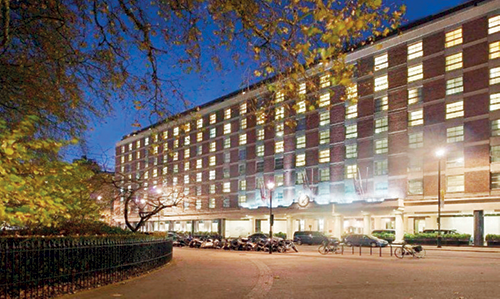
I commenced my research interviews with people I knew well. I travelled to Cosham and Portsmouth to interview a couple of hospitality experts who supported me during my ILO/UNDP fellowship in 1982. I also contacted two Senior Lecturers of the South Devon Technical College, who had presented a two-week Hotel Management seminar in Sri Lanka in 1982. Having attended this seminar, I became friends with them.
“Chandi, why don’t you take a break from your hectic schedule in London and visit Dr. David Dann and I in Torquay? You both spend a weekend at my home and try my wife, Clair’s British cooking skills”, Tim Hornsey invited us over the telephone. Torquay is a beautiful seaside town in Devon, with numerous archaeological remains dating back to pre-historic times. In addition to hosting us, Tim and David and their wives took us to see The Imperial. They also arranged for me to interview the renowned hotelier who managed it, Harry Murray.
Using Part-time Work for Research
My readings, research interviews and informal discussions provided an enormous amount of data pertaining to my research topic. In addition, I collected many brochures, menus, wine cards, promotional material, control documents etc. from most of the London five-star hotels. These were carefully analysed prior to writing the dissertation. However, mid-way during the research activity, I felt strongly that in order to obtain insight into the actual hotel operations, it would be ideal to work in different capacities in various hotels.
I continued to work at The Dorchester as a part-time banquet waiter. Due to that valuable experience in the best hotel in UK, I was able to find part-time work in two other five-star hotels on Park Lane – London Hilton and InterContinental London. I also began working as a part-time banquet waiter at Claridge’s, which had opened in the nineteenth century. Doing similar work in four five-star hotels concurrently, provided me an excellent opportunity to compare and contrast their standards in food and beverage operations and banqueting.
Although I liked the old-world charm of Claridge’s and The Dorchester, I found that the food and beverage operations of the newer (originally) American chain hotels, InterContinental and Hilton, were far more efficient. Having previously worked at two InterContinental hotels in two other countries (Sri Lanka in 1973 and Hong Kong in 1981), I was familiar with their standards of operation in banquets. I was most impressed with the London Hilton, which had the most efficiently managed banquet operation in London.
As the demand on me to work as a banquet waiter in London increased, I became very busy. Often, I did three-hour shifts for meal services only. For such a short shift, I was paid only £8.40. On some days, I did three shifts in three hotels for breakfast, lunch and dinner. In between, I did research interviews. I became keen in gaining different types of five-star hotel experiences in London at a higher level.
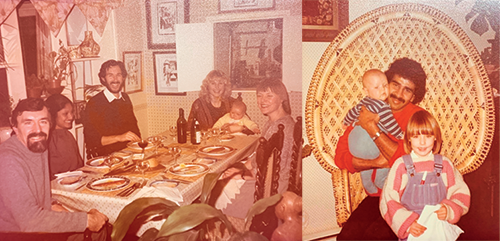
Using Management Trainee Positions for Research
I spoke with my friend, Mr. Wilfred Weragoda, the Food & Beverage Controller of The Dorchester. Based on my new request, he arranged for me to spend two weeks in his department as a Food & Beverage Controls Trainee. In addition to learning different aspects of Food and Beverage operations, that brief exposure opened new doors for me.
One day, I interviewed W. A. Lipscombe, Managing Director of Hallway Hotels in his office in London. He was a friend of Mark Bostock, then Chairman of John Keells Group, who arranged my first Management Trainee assignment in UK with Trust House Forte in 1979. Due to their friendship, I was able to secure with good pay an excellent management trainee position in a 500-room five-star hotel in London. Lipscombe told me, “Chandi, hotels in my company are not five-star. Therefore, I will use a good contact of mine – The Managing Director of The Churchill, to arrange six weeks exposure in six departments for you. I will tell Mark that I did you a favour.”
The Churchill experience was excellent. I spent a week each in six departments – purchasing, receiving bay and stores, food and beverage controls and accounts department, reservations, banquets, restaurants and room service, and finally, kitchen. I also did a few research interviews, there. The most useful interview was given to me on my last day at The Churchill, by the company’s Managing Director, G. Webb. I was also exposed to The Churchill’s four-star sister hotel in London, The Montcalm.
I was encouraged with the success of my Management Trainee assignments at The Dorchester and The Churchill, in the context of enhancing my graduate research and acquiring experience and knowledge. These exposures also improved my résumé. With that enthusiasm, I approached my contacts at Trust House Forte, who arranged a short Management Trainee assignment for me at the 85-year-old five-star, The Hyde Park Hotel. There, I worked directly under its veteran General Manager, A. Grosso, who also gave me an opportunity to conduct one of my longest and useful research interviews.
Soon after that I was sent to the Trust House Forte Group’s flagship hotel, Grosvenor House, for a couple of weeks. I was pleased with this opportunity as Grosvenor House had the largest five-star Food and Beverage operations in UK. I did a few more research interviews there. One of those I interviewed was Ben Davis, the Food & Beverage Manager. In 1990’s both Ben and I held the same position in the Caribbean, as the General Manager of Trust House Forte’s 360-room five-star hotel – Jamaica Pegasus/Forte Grand.
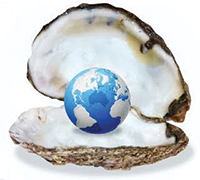
I enjoyed full-day orientations at four five-star hotels in London at the commencement of each of my Management Trainee assignments. The most memorable orientation was at The Dorchester, due to one gentleman who made a big, positive impact. It was Udo Schlentrich, General Manager of The Dorchester. He was the only General Manager who met each group of new employees during their orientation. This Austrian-born hotelier trained in the best two hotel schools in the world (Lausanne in Switzerland and Cornell in USA), said something during the orientation, which remained permanently in my mind.
Udo Schlentrich said, “Thank you for joining the best British hotel – The Dorchester. Ladies and gentleman, as the General Manager I am just the conductor of the orchestra, but it is all of you who provide the music. Please do your best, to make our customer happy.” After that he had his lunch at the staff cafeteria with the new employees in the orientation. He sat next to me and had a friendly chat over lunch. He also gave me a research interview. Udo was a big inspiration to me. In later years, like me, at the hight of his hotel career he did a doctorate and became a professor.
The rest of my career, whenever there was an orientation in a hotel which I managed, I thought of what Udo Schlentrich did at the Dorchester in 1984, and I did something similar. The best practices one learns in the real-world trumps academic learning in universities.
Will continue in next week’s column: ‘Research at 16 Five-star Hotels – Part ‘B”.







